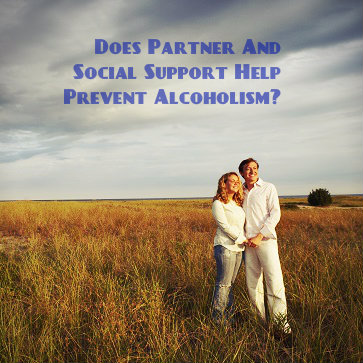Does Intimate Partner Support Help Offset Risks For Alcoholism?
Social support is the general term for the connections we develop and maintain between family members, friends and other loved ones or more distant acquaintances. Generally speaking, people with highly developed forms of these connections have an increased ability to withstand daily and traumatic stresses and cultivate a sense of mental/emotional well-being. In a study published in February 2014 in the journal Alcoholism: Clinical & Experimental Research, researchers from Purdue University explored the impact good social support has on the genetic and environmental risks for developing a diagnosable case of alcohol abuse or alcoholism.
 Benefits Of Social Support Networks
Benefits Of Social Support Networks
Social support networks can involve many people or just a few. In addition, they can form in informal settings such as friendships, blood relationships or intimate partnerships, or in more formal settings such as clubs, churches, associations or other organizations. Forms of support that can come from belonging to a given network include emotional support, physical or material support and the support provided by sharing various types of valuable or relevant information. In addition to improved stress resistance, current evidence indicates that people who can consistently rely on their social support networks experience benefits that include reduced risks for chronic illness, higher rates of survival when chronic illnesses strike and increased access to important resources and opportunities.
Genetic And Environmental Risks For Developing Alcohol Use Disorder
People who consistently misuse alcohol significantly boost their chances of developing alcohol use disorder (the modern-day term used to describe the symptoms of both alcohol abuse and alcoholism). Any given person’s overall odds for experiencing this disorder stem from both genetic and environmental factors. Broadly speaking, genetic factors come from inherited changes or alterations passed on through a person’s DNA, while environmental factors include all influences that first arise after a person is born.
The National Institute on Alcohol Abuse and Alcoholism reports that about half of all known risks for alcoholism are genetic in nature. Instead of acting in simple, entirely predictable ways, the inherited chances of developing alcoholism interact in any given individual and produce unique hereditary risk profiles. Similarly, environmental factors have a complex, overlapping impact on alcoholism risks rather than acting in completely predictable patterns. Despite the level of uncertainty involved, researchers and doctors can typically look at a person’s combined genetic and environmental risk factors and roughly determine his or her chances of developing diagnosable alcohol-related problems.
Impact Of Social Support On Risks For Developing Alcohol-Related Issues
In the study published in Alcoholism: Clinical and Experimental Research, the Purdue University researchers used an examination of 672 sets of adult twins to determine the impact of social support on both the genetic and environmental risks for developing alcohol-related issues. They conducted this project because very little research had been done on the alcohol-related effects of social support, in particular. Specific forms of social support under consideration included family-based support, friend-based support and the support provided by an intimate partner. The researchers used a sophisticated form of analysis to separate the effects of genetic influences from the effects of environmental influences in each study participant.
Intimate Partner Support And Impact On Alcohol Abuse
After reviewing their findings, the researchers concluded that, in any given individual, the mixture of genetic and environmental factors for alcohol-related problems varies according to how much social support that person gets from an intimate partner. Specifically, people with low levels of intimate partner support are affected by environmental factors more often than genetic factors, while people with high levels of intimate partner support are affected by genetic factors more often than environmental factors. The researchers also concluded that the presence of strong social support from a friend or family member does not have any substantial effect on the genetic and environmental risks for alcohol abuse or alcoholism.
Determining If Someone Will Be Susceptible To The Environmental Factors That Contribute Alcohol Problems
The authors of the study published in Alcoholism: Clinical & Experimental Research believe they have identified a potentially critical aspect of the underlying equation that helps determine if a person will be susceptible to the environmental factors known to contribute to the development of diagnosable problems with alcohol consumption. Specifically, they note the importance of knowing which types of social support reduce environmental risks. In the future, doctors may be able to use measures of social support to increase their ability to predict the eventual onset of alcohol use disorder in their patients.
Read More About 12 Step Programs – A Guide For Families Of Addicts



